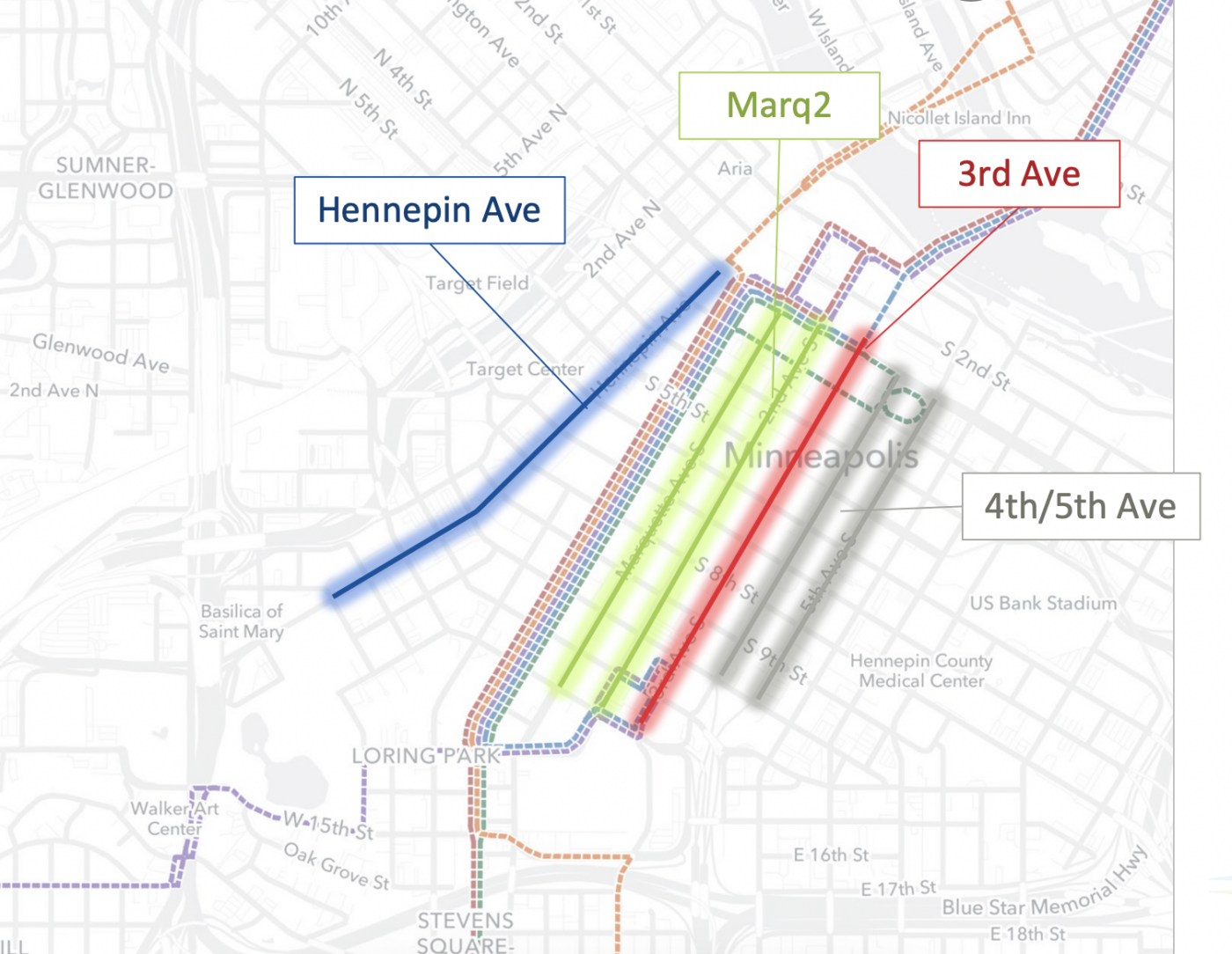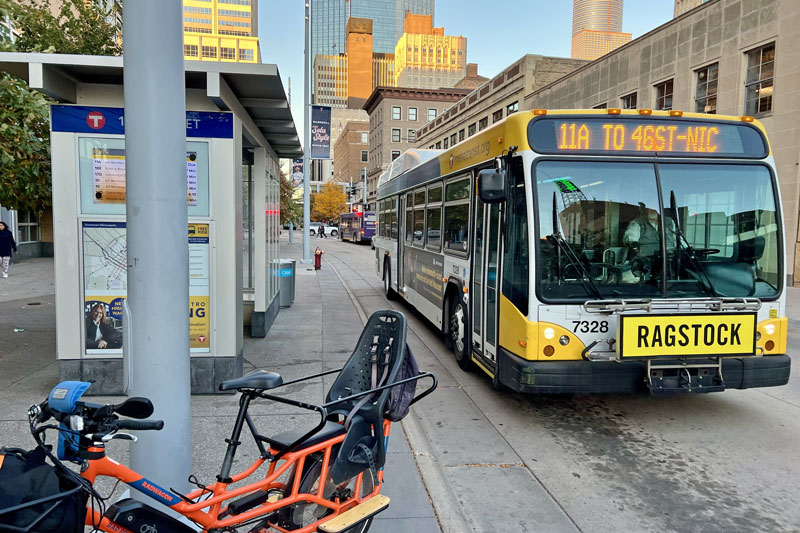Coalition Calls for Nicollet Mall Options that Improve Bus Service Downtown
Creating vibrant downtowns and city streets requires planning that welcomes people—neighborhood residents, workers taking a walk on their lunch break, families running errands on the bus, friends on bikes meeting up for dinner and an evening concert. More space for people walking, bicycling, rolling, and taking transit builds a more sustainable and inviting city for everyone. But these ways of getting around shouldn’t be forced to compete. So, as Minneapolis considers the future of Nicollet Mall, Move Minnesota and partners are calling on officials to ensure proposals will maintain or improve bus service downtown.
The conversation about converting Nicollet Mall to a pedestrian plaza re-emerged last year. In June 2023, a mayor-appointed Vibrant Storefronts Working Group published a report on improving commercial vitality in downtown Minneapolis and included as one of its recommendations: “consider turning Nicollet Mall into a pedestrian-only zone.”
In December 2023, the Public Works Department outlined primary considerations for such a shift, including “How to ensure service remains as good or better for transit riders?” and how any change would impact future transit projects. In July, the department shared three proposals to reroute buses from Nicollet to other downtown streets with the Minneapolis City Council’s Climate and Infrastructure Committee. This month, Sierra Club North Star Chapter, Move Minnesota, and local partners sent a joint letter to City of Minneapolis and Met Council leadership with concerns that “proposed alternatives do not yet meet the essential criteria” of improving service for current and future transit riders.
Having more space dedicated to people walking, bicycling, rolling, and taking transit is crucial to building a sustainable and welcoming city. These modes shouldn’t be forced to compete.
From the joint letter signed by Move Minnesota, Sierra Club North Star Chapter, and allies
Getting this project right has major implications. According to the City, there are more transit trips on Nicollet Mall than any other corridor in the city. Each weekday, 635 bus trips carry 4,200 to 5,700 people traveling along Nicollet Mall, with 10,700 people getting on or off buses along Nicollet. The mall is also part of the METRO F Line—a bus rapid transit project currently in the design phase that will extend from the Northtown Transit Center in Blaine to downtown Minneapolis.
The three proposals shared by the Public Works Department this summer feature some needed infrastructure improvements, including a complete reconstruction of Third Avenue to accommodate bus rapid transit and local bus routes in two directions, as well as an upgraded bicycle lane. But they also have significant flaws, like proposing to move buses from Nicollet to Hennepin Avenue without any additional study or implementation of dedicated bus lanes. Among the proposed designs, Option 2 is especially bad for transit riders.

“We do not dismiss the potential benefits of moving buses on Nicollet Mall to other streets, but multiple factors must be considered,” the letter emphasizes. Among those considerations:
- Total Travel Time: The proper measurement of a person’s transit trip is “door to door” including walking or rolling on both ends of the trip. The City’s own data shows transit on Nicollet Mall brings the most people closest to their final destinations.
- Dedicated Lanes: While average speed is important, the value of dedicated lanes in providing reliability must not be dismissed. Buses traveling in mixed traffic with cars and trucks might have an acceptable average speed, but riders on those buses can still get jammed up in congestion. If an employee is late to work, their boss doesn’t typically care about “average speeds.”
- Direct Routing: The most direct route for buses traveling on Nicollet Avenue south of Nicollet Mall is to continue traveling on Nicollet Mall.
Especially with unprecedented Metro Transit funding finally available, we expect city and regional decision-makers to proactively maximize these investments and ensure bus and train service is better than ever for everyone who lives, works, and visits the Twin Cities. We also know we can have amazing transit service AND amazing public spaces for people to bike, walk, roll, and enjoy. It’s not an either/or.
That’s why Move Minnesota and partners are calling on leaders to reconsider the proposals for Nicollet Mall to: a) eliminate Option 2 from further consideration, b) study Options 1 and Option 3, with the addition of evaluating dedicated lanes on Hennepin Avenue as described in the City’s adopted Transportation Action Plan and c) not assume buses can be removed from Nicollet Mall but instead study and consider improvements that do not include removal.
We also want to call out that removing buses on Nicollet Mall isn’t a one-step recipe for a successful pedestrian plaza. The City must be committed to making pedestrian areas meaningfully welcoming and accessible to everyone, including transit riders, with permanent seating, public art, drinking fountains, shade, and other amenities and programming that will invite more people into these spaces and encourage spending time there.
There’s still plenty of time to impact the project before city staff identify a preferred alternative sometime in the winter. The earliest buses could move off Nicollet Mall would be 2026, after a memorandum of understanding with Metro Transit.
Reach out to project staff to share your input. Stay tuned for more ways you can get involved!
For more on the future of Nicollet Mall and downtown bus service, read the full letter signed by Sierra Club North Star Chapter, Bicycle Alliance of Minnesota, Hennepin for People, ISAIAH, MN350, Move Minnesota, and Neighbors for More Neighbors.

